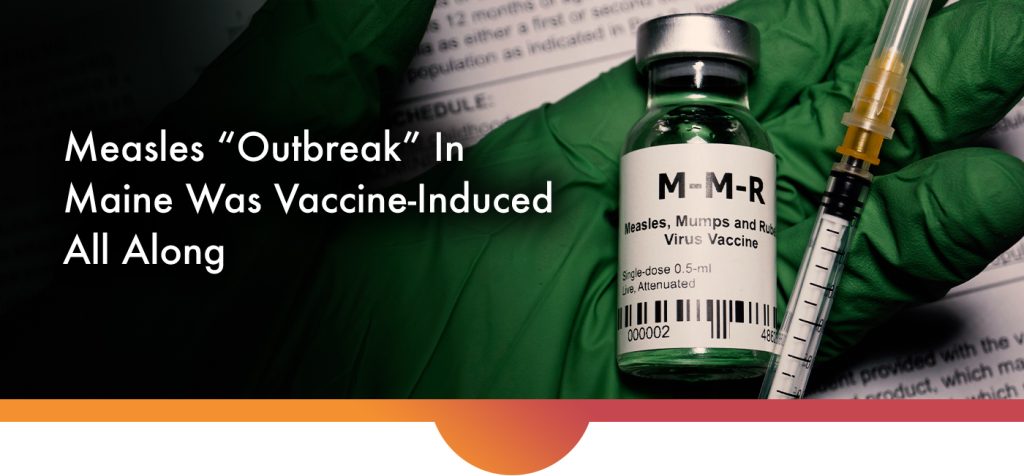

ICAN’s attorneys obtained documents related to the widely reported May 2023 “outbreak” of measles in Maine. As it turns out, test results from the CDC confirmed that the measles case was “consistent with vaccine strain,” meaning there was no “outbreak” and, instead, it was the vaccine that caused the child’s rash.
Lead Counsel, Aaron Siri, Esq. lays out the details here:
On May 5, 2023, the Maine CDC reported that a child had “tested positive” for measles. News outlets immediately began fearmongering, hinting that the “outbreak” was due to low vaccination rates:
- “Measles can be serious for anyone…” (Maine CDC Facebook Page)
- “In severe cases, measles can cause pneumonia, brain swelling and death.” (Bangor Daily News)
- “The CDC says roughly one to three of every 1,000 children infected with measles die.” (USA Today) Note: the death rate is actually more like 1 in 500,000.
- “Measles was declared eliminated from the US in 2000… But vaccination rates in the US have dropped in recent years, sparking new outbreaks.” (CNN)
- “Anyone who is not immunized or does not know their measles immunization status should get vaccinated.” (Maine CDC Press Release)
The Maine CDC reported that even though the child had received a dose of the measles, mumps, and rubella (MMR) vaccine, it was “considering the child to be infectious out of an abundance of caution.” In the meantime, the Maine CDC indicated it had sent a specimen to CDC headquarters to determine the specific strain of measles; however, it did not mention how the child would have been exposed to the wild strain of measles, such as international travel, nor did it share how recently the child may have received the vaccine.
According to a WHO report, about 2% of those who receive the measles vaccine develop a rash, called VARI (vaccine-associated rash illness). In fact, one study recommends assuming the rash is vaccine-caused and that “testing should only be considered if exposure to the wild-type (not vaccine-strain) virus is strongly suspected.”
So, it is unclear why the Maine CDC raised the alarm and then took so long to confirm the specific strain. The child was diagnosed on May 3, but it took the Maine CDC five days to ship the sample to the CDC. It then took the CDC seven days to report the results and for the Maine CDC to announce the child was not infectious.
ICAN, through its attorneys, requested relevant records and received them. Incredibly, they reveal that the positive measles test was “[c]onsistent with vaccine strain,” which is apparently an “acceptable” form of measles because, as the Maine CDC announced, the strain that the child tested positive for was not considered “an infectious strain of the virus,” despite causing traditional symptoms of the disease. Decidedly absent from Maine’s announcement was the fact that the child got measles as a result of the vaccine. Maine and the CDC simply hid this fact from the public.
Maine’s actions make sense, however, when considering that it may have just been following a CDC marketing presentation which states that the perfect “recipe” for creating demand for vaccines “requires creating concern, anxiety, and worry” by, for example, having medical experts and public health authorities “state concern and alarm (and predict dire outcomes)” and show “[v]isible/tangible examples of the seriousness of the illness (e.g., pictures of children, families of those affected coming forward) and people getting vaccinated (the first to motivate, the latter to reinforce)” — all things we saw implemented during this “outbreak.”
ICAN will continue to follow-up on reported outbreaks across the country. In the meantime, catch up on some of ICAN’s additional work on vaccine policy:
- ICAN’S MONUMENTAL MISSISSIPPI WIN
- FDA CONTINUES TO AVOID ICAN’S PETITION TO SUSPEND THE IPOL POLIO VACCINE FOR CHILDREN
To support future legal actions like these, click here to donate!
